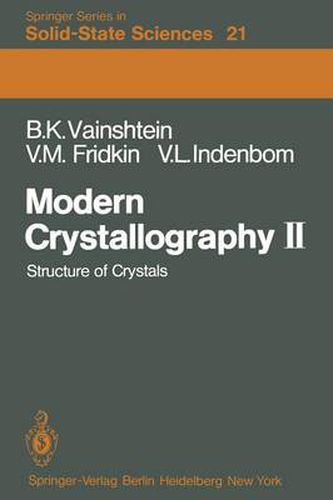Readings Newsletter
Become a Readings Member to make your shopping experience even easier.
Sign in or sign up for free!
You’re not far away from qualifying for FREE standard shipping within Australia
You’ve qualified for FREE standard shipping within Australia
The cart is loading…






This title is printed to order. This book may have been self-published. If so, we cannot guarantee the quality of the content. In the main most books will have gone through the editing process however some may not. We therefore suggest that you be aware of this before ordering this book. If in doubt check either the author or publisher’s details as we are unable to accept any returns unless they are faulty. Please contact us if you have any questions.
Early in this century, the newly discovered x-ray diffraction by crystals made a complete change in crystallography and in the whole science of the atomic structure of matter, thus giving a new impetus to the development of solid-state physics. Crystallographic methods, pri marily x-ray diffraction analysis, penetrated into materials sciences, mol ecular physics, and chemistry, and also into many other branches of science. Later, electron and neutron diffraction structure analyses be came important since they not only complement x-ray data, but also supply new information on the atomic and the real structure of crystals. Electron microscopy and other modern methods of investigating mat ter-optical, electronic paramagnetic, nuclear magnetic, and other res onance techniques-yield a large amount of information on the atomic, electronic, and real crystal structures. Crystal physics has also undergone vigorous development. Many re markable phenomena have been discovered in crystals and then found various practical applications. Other important factors promoting the development of crystallog raphy were the elaboration of the theory of crystal growth (which brought crystallography closer to thermodynamics and physical chem istry) and the development of the various methods of growing synthetic crystals dictated by practical needs. Man-made crystals became increas ingly important for physical investigations, and they rapidly invaded technology. The production of synthetic crystals made a tremendous impact on the traditional branches: the mechanical treatment of mate rials, precision instrument making, and the jewelry industry.
$9.00 standard shipping within Australia
FREE standard shipping within Australia for orders over $100.00
Express & International shipping calculated at checkout
This title is printed to order. This book may have been self-published. If so, we cannot guarantee the quality of the content. In the main most books will have gone through the editing process however some may not. We therefore suggest that you be aware of this before ordering this book. If in doubt check either the author or publisher’s details as we are unable to accept any returns unless they are faulty. Please contact us if you have any questions.
Early in this century, the newly discovered x-ray diffraction by crystals made a complete change in crystallography and in the whole science of the atomic structure of matter, thus giving a new impetus to the development of solid-state physics. Crystallographic methods, pri marily x-ray diffraction analysis, penetrated into materials sciences, mol ecular physics, and chemistry, and also into many other branches of science. Later, electron and neutron diffraction structure analyses be came important since they not only complement x-ray data, but also supply new information on the atomic and the real structure of crystals. Electron microscopy and other modern methods of investigating mat ter-optical, electronic paramagnetic, nuclear magnetic, and other res onance techniques-yield a large amount of information on the atomic, electronic, and real crystal structures. Crystal physics has also undergone vigorous development. Many re markable phenomena have been discovered in crystals and then found various practical applications. Other important factors promoting the development of crystallog raphy were the elaboration of the theory of crystal growth (which brought crystallography closer to thermodynamics and physical chem istry) and the development of the various methods of growing synthetic crystals dictated by practical needs. Man-made crystals became increas ingly important for physical investigations, and they rapidly invaded technology. The production of synthetic crystals made a tremendous impact on the traditional branches: the mechanical treatment of mate rials, precision instrument making, and the jewelry industry.